经常被同学们问到雅思口语考试怎么能够瞬间提分,以前我很长一段时间来都是告诉大家欲速则不达,口语的提高还是需要平时多积累多练的。
最近我开始自己设计雅思口语备考课程,在听同学们的录音作业时,想不过分享给我的考官朋友,看看我俩的评分是否一致。然后发现他给会运用idioms的同学普遍给分高于我的,有时候会高出1到1.5分的差别,觉得很不可思议。
英语里的idioms翻译成中文是习语,惯用语,相当于我们中文里的谚语和成语,用的恰到好处时不仅能让我们的谈吐显得有趣,而且还能充分展现我们英语的地道程度。所以呢今天我想与你们分享10个最常见的可以用到雅思口语考试中的idioms,帮助你们瞬间提分!
电子版下载:
- To put all your eggs in one basket (孤注一掷,在一棵树上吊死)
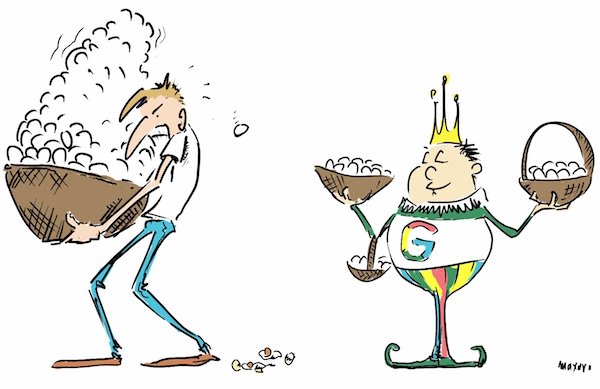

第一个习语: To put all your eggs in one basket,表面意思是把所有鸡蛋放在同一个篮子里,实际意思是孤注一掷,在一棵树上吊死。我们经常听说“don’t put all your eggs in one basket”,这个至理名言的意思是不要孤注一掷,不要把一切希望寄托在一件事上。我们在描述自己的人生选择时也可以用起来。
记得我第一次用它时,是在国内参加雅思考试时。当时考官问我:
“What’s your plan after graduation?”
我当时大概说的是:
“I’d like to enroll in a master progam in the United States and I’m currently applying for five universities.”
然后他追问:“Why five?” 我回答说,
“Because I don’t want to put all my eggs in one basket. I’ll definitely have better chances of getting at least one offer.”
记得考官微微点头,在他的那个小本本上写了什么。我当时的直觉是我的这个习语用的好,开场给了个很高的印象分。
2. The best of both worlds (两全其美,各取其长)
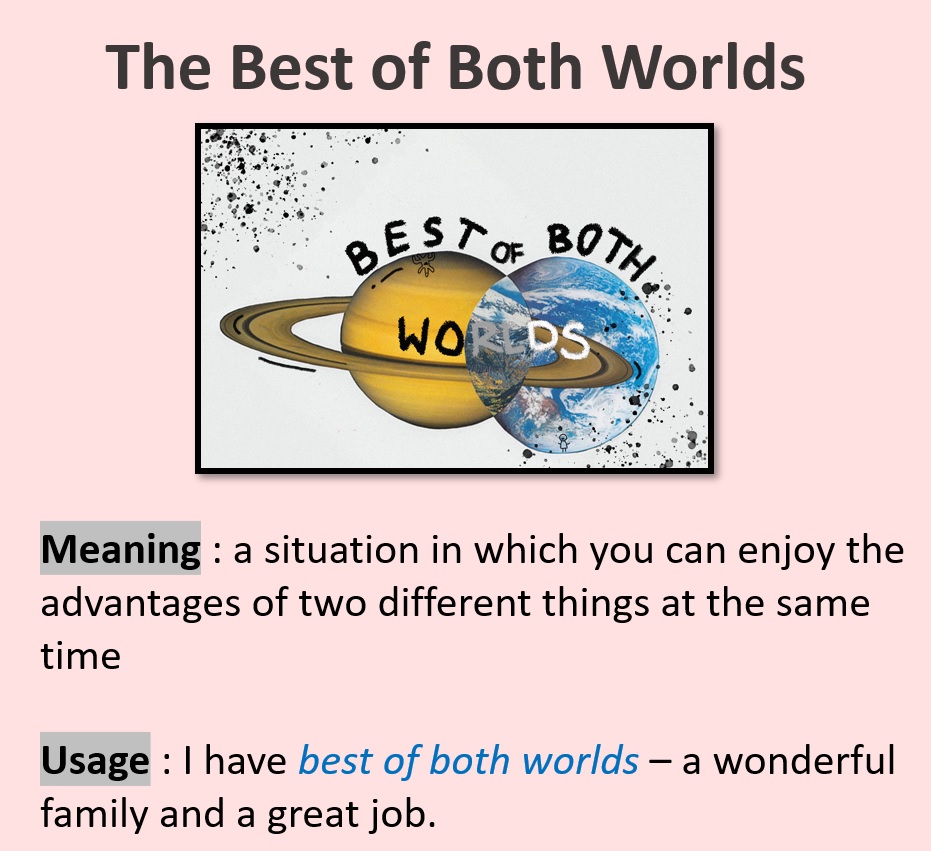

然后雅思考试第一部分warm-up session考官还喜欢问:
“Why do you want to go study abroad?”
我们经常听到一些很无趣很平庸的回答,比如出国深造回来以后能找到更好的工作之类的。
不要这么回答,我们可以尝试展现自己有趣的灵魂,比如:
”The main reason that urges me to go study abroad is that I’d like to experience the best of both worlds.”
当我们说某样东西是the best of both worlds,想要表达的是:我们能同时享受两种很不一样的事物带来的好处。所以关于这个问题,我们还可以追加说,
“I’d love to compare the differences in western and Eastern cuisine, different ways of learning, and diverse lifestyles. In this way, I get to see the best of both worlds. ”
这么聊天考官会对你刮目相看!
3. Bread and butter (谋生之道,主要收入来源)
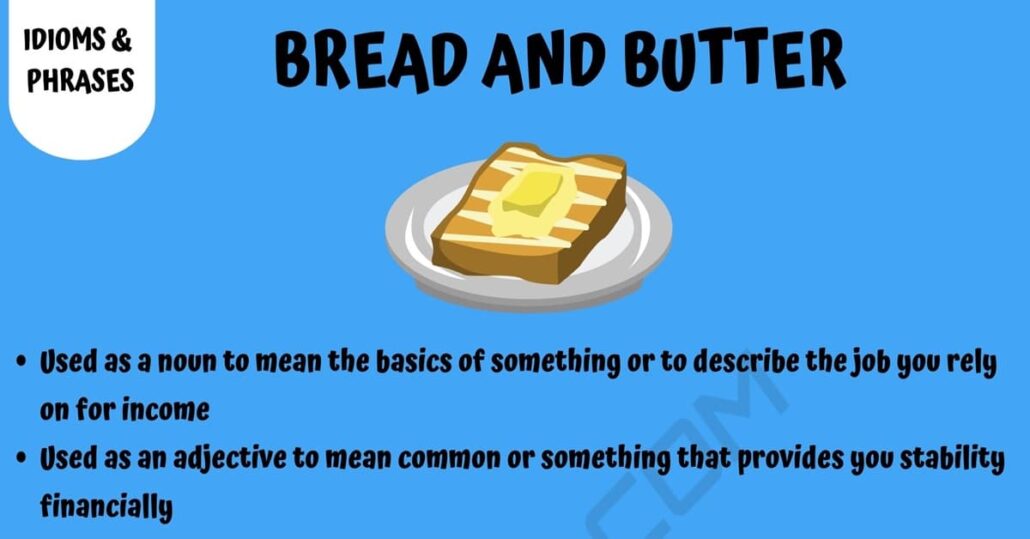

另外对于工作了的同学,在这个warm-up session考官还特别喜欢问 ,
“Do you like your job? Why did you choose that job?”
我们可以这样回答,
“It’s a perfect fit of my educational background and my talents. Plus, it’s my bread and butter.”
面包和黄油是西方人经常吃的东西,连在一起就是主要收入来源。那我们不经意的插一句“It gives me my bread and butter”,听起来是非常地道加分的。
4. Give somebody food for thought (引人深思的)
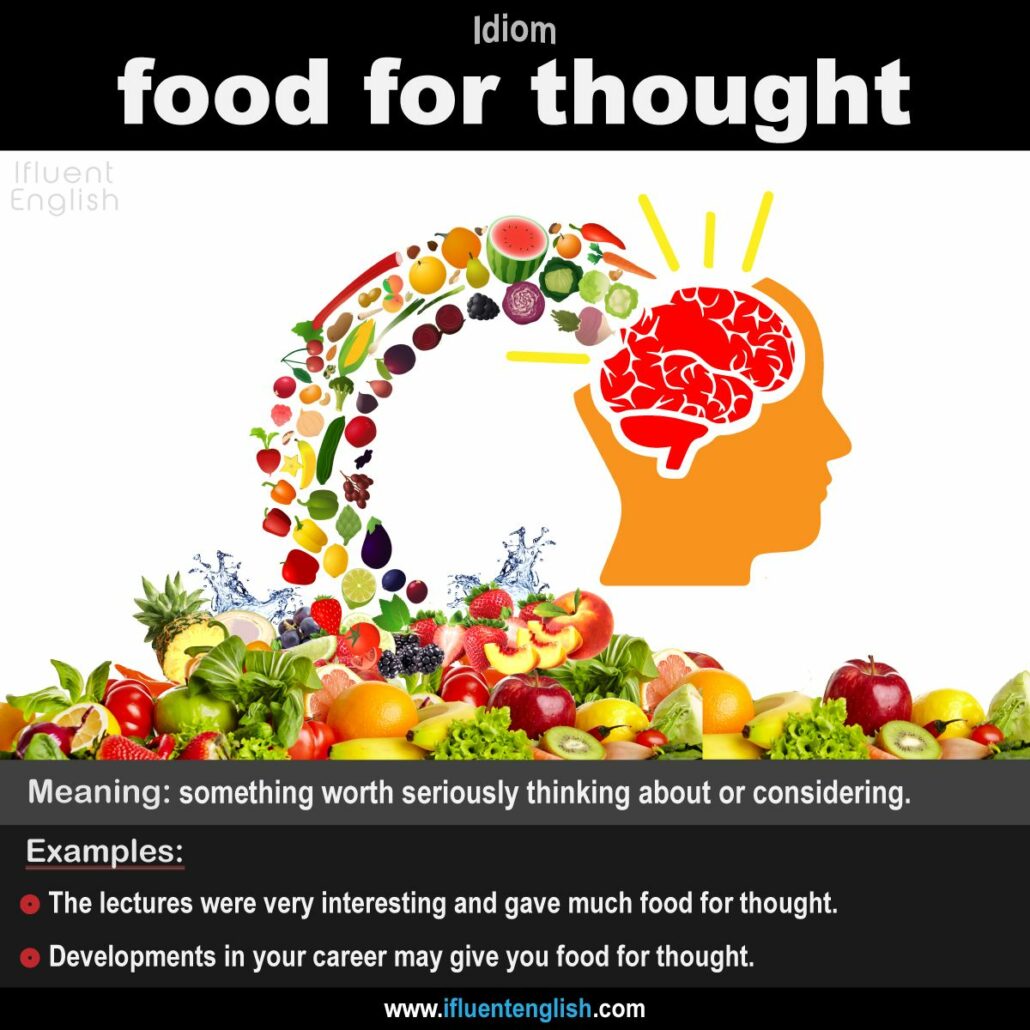

还有一个很好用的idiom是give somebody food for thought,字面意思是精神的粮食,实际上就是引人深思的东西。比如我们在描述自己最喜欢的书时可以这么用:
“My favorite book at the moment is Educated which gave me food for thought on the significance of education.”
然后我们可以展开来说为什么这本书引起我深思。这个表达可以用于很多需要深度思考的话题,比如:
“What do you think makes a good painting?”
我们可以这样回答:
“I think a good painting needs to give people food for thought, to begin with.”
还比如下面这个问题:
“What kind of advertisements do you like the most?”
我会这么回答:
“I normally switch channels when I run into advertisement on TV. But once in a while, some ads succeeded in grabbing my attention which have a message behind, and somehow gave me food for thought. An excellent example is the likeagirl ad campaign. It challenged the conventional idea that playing sprots like a girl is a bad thing. The message was so inspiring that it encouraged girls around the world to feel more confident and positive.”
5. Not my cup of tea (不合我胃口,非我所爱)


接下来一个经典表达,是日常生活中英美人士都超爱用的:not my cup of tea,字面意思是不是我的茶,翻译过来就是非我所爱,不符合我的胃口。
这个idiom可以用于任何一个你不喜欢的东西。比如考官问你:
“Do you like pets?”
你可以说:
“Keeping a pet is not my cup of tea. It’s not that I don’t like animals, it’s just that I don’t have the energy or the space to take care of one. ”
再比如我们在讨论自己喜欢的或不喜欢的音乐时可以说:
“Rock music is not my cup of tea, but I’m a huge fan of classical music, such as pieces composed by Yann Tiersen. They are just more comforting and soothing to me. ”
6. Once in a blue moon (少有的,罕见的)


另外我们讲到不喜欢什么东西时,还可以用一个更夸张但很常见的习惯用语,就是:once in a blue moon。
你们什么时候见过蓝色的月亮?所以这个idiom就是想说很少有的时候。
比如不爱运动的同学碰到考官问,
“What’s your favorite sport?”
你可以说,
“Actually I’m not very athletic. Once in a blue moon, I would go out hiking with my friends for a little bit. But most of the time, I lead an extremely sedentary lifestyle.”
当然我们还可以加一句,聊一下考官想听到的sport:
“But I do want to make a change and pick up a sport, like cycling. It’s definitely healthier to stretch out a bit and enjoy some fresh air outdoor.”
7. A drop in the ocean (沧海一粟、九牛一毛)
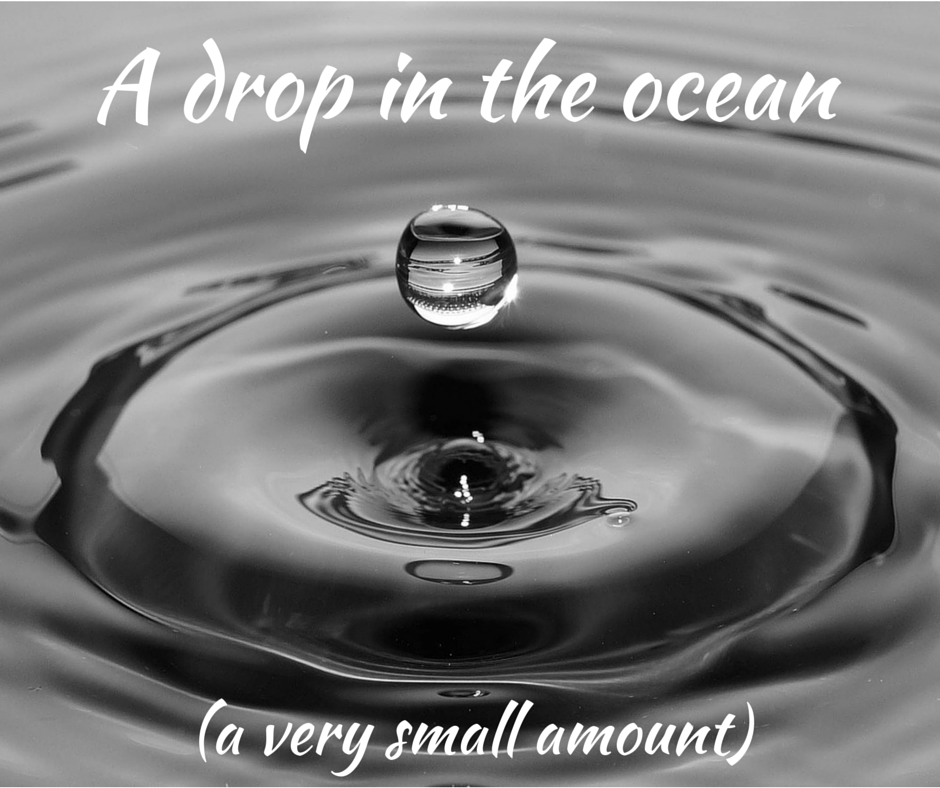

还有一个类似的谚语a drop in the ocean, 大海里的一滴水,就相当于我们成语里的“沧海一粟”和“九牛一毛”。
比如我们在讨论环保话题时考官他问:
“How can people protect the environment? ”
那我可以回答说,
“I think people can adopt a healthier lifestyle to protect the environment, such as not using plastic bags when going grocery shopping. I know some people would criticize and say that it’s just a drop in the ocean, and can hardly make any difference. But I do think it’s small things like this that would make a difference in the long run.”
8. Know something like the back of my hand (对什么东西了如指掌)
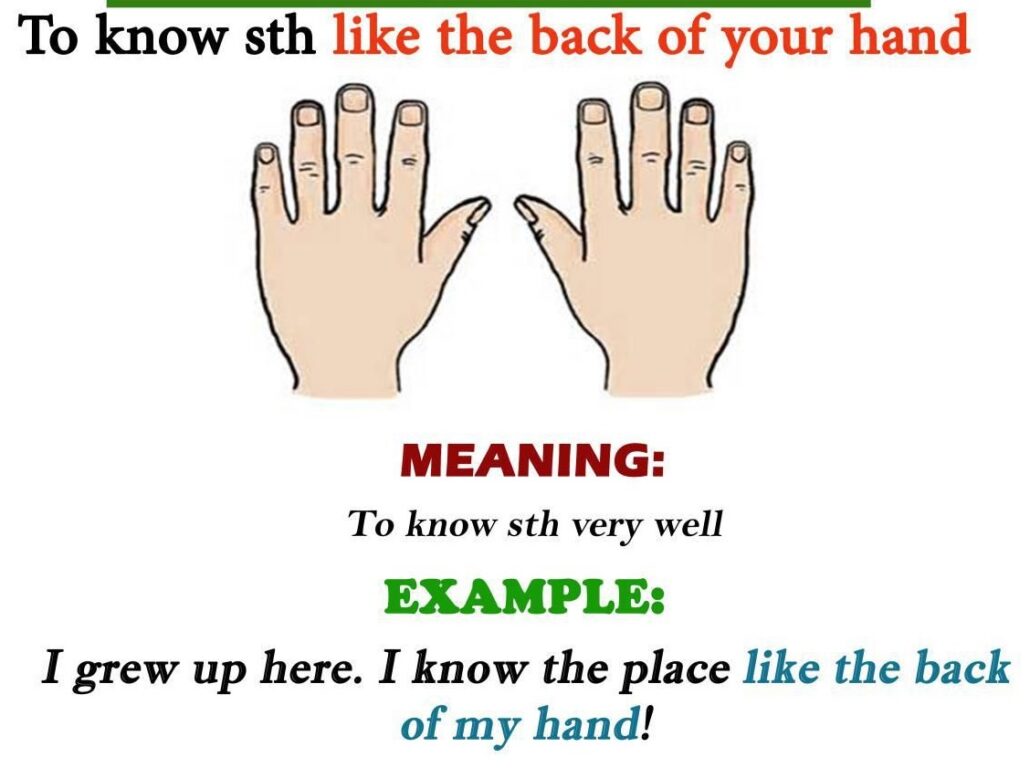

然后我还想分享一个在工作中我同事们很喜欢用的表达:know something like the back of my hand,就是对什么东西了如指掌。
他们是为了谦虚在解释什么话题前喜欢加一句,
“I don’t know Arabic culture like the back of my hand, but what I do know is that blablabla…”
我们在考场上当碰到一个自己不太了解的话题,或者很棘手的问题时,可以用这个长长的表达来为自己争取一两秒钟的思考时间,又地道又好用。
比如考官问:
“Tell me a piece of artwork that you like.”
不少同学可能会很抓狂,说,
“Oh no, I don’t know any art! ”
这个时候我们要深呼吸,然后故作镇定的说,
“Actually, I don’t actually know art like the back of my hand, but I guess I can the Starry Night by Vincent van Gogh is my favourite piece of artwork.”
是不是很救场的金句?
9. Off the top of my head (不假思索地)


还有一个类似的表达也可以帮我们争取一点点的思考时间:off the top of my head。
The top of one’s head就是一个人的头顶。那Off the top of one’s head就是想说,我们对某件事情没有准确的信息,但是凭借我的记忆或猜测可以这么给出意见。
比如考官问:
“What’s your favorite movie? ”
我们可以回答说,
“I watch movies of different genres all the time, like comedy, science fiction and chick flicks. Off the top of my head, I would say the Star War series is one of my favorites.”
我在给出我最喜欢的电影前加了这么多的前缀,就是为了buy me some time。保持我的回答很流利。是不是很棒呢?
10. Make a long story short(长话短说)


最后一个表达是to make a long story short,意思就是长话短说,非常适合用于结尾。
比如雅思口语考试第二部分需要我们自言自语2分钟回答一个问题,当我们把想说的说完以后,可以这么自然的收尾:
“To make a long story short, the Strasbourg Cathedral is my favourite piece of architecture.”
这样子考官知道我讲完了,他还会感叹说,这位同学知道这么经典的习语,真不错!高分不给你还给谁呢?
电子版下载:
最后注意:这些idioms非常的informal,适合用于英语考试口语部分,不适合用于写作,写作的表达需要更正式一些。
最最后希望大家可以在口语考试中用起来,拿满分!感谢阅读!
